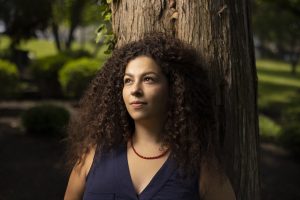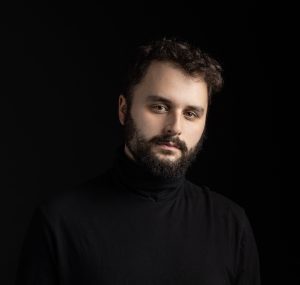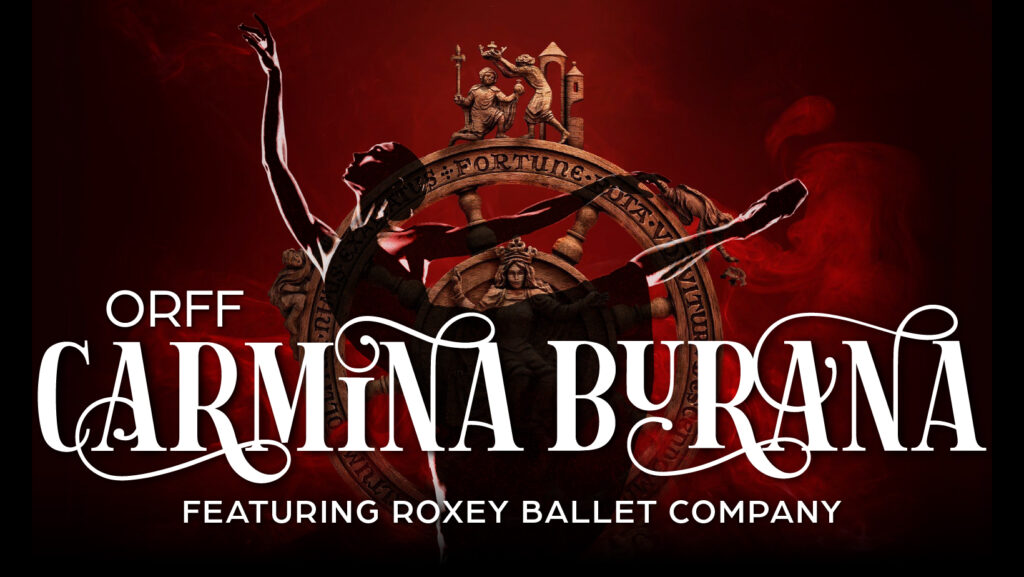Brahms: Ein Deutsches Requiem
Brahms: Ein Deutsches Requiem
Emily Donato, soprano
William Socolof, bass-baritone
October 23, 2022
4:00 PM
Richardson Auditorium
Princeton University
Brahms: Ein Deutsches Requiem
Emily Donato, soprano
William Socolof, bass-baritone
October 23, 2022
4:00 PM
Richardson Auditorium
Princeton University
Click above to listen to the Director's Notes
Use Up/Down Arrow keys to increase or decrease volume.
DIRECTOR'S NOTES
"If he will only point his magic wand to where the powers amassed in the orchestra and chorus lend him its might, yet more wonderful glimpses into the mysteries of the spirit world await us."
Thus predicted Robert Schumann in 1853 about the then twenty-year-old Johannes Brahms. Johannes had impressed Robert and his wife Clara with his piano compositions, and they hoped the talented young man would contribute to the great Beethovenian symphonic tradition of the nineteenth century. Brahms set to work on a symphony around 1855, but it wasn’t until 1876, more than twenty years later, that he managed to emerge completely from the shadow of Beethoven’s Ninth and complete his own symphony. But it wasn’t Brahms’s first symphony that established him on the German musical scene; it was, instead, Ein deutsches Requiem, completed eight years earlier—the longest piece he would ever write.
Loss. Grief. Mortality. Among the composers who have dared to confront these inevitabilities, some have created compositions of immense power and, sometimes, conjured portals through which we might gain the “glimpses into the mysteries of the spirit world” that Schumann imagined. Each such piece reflects the circumstances under which it was written. Consider, for example, Mozart and his Requiem. Scribbling feverishly in the final days of his tragically curtailed life, the thirty-five-year-old Mozart poured out his grief, emphasizing the urgency and uncertainty animating the traditional Catholic Requiem text. With just two movements fully scored and the fate of his soul unknown, Mozart ended his manuscript—and life’s work—with sketchy indications of the agitated “Confutatis,” breaking off just eight measures into the tearful sighs of the “Lacrymosa.” As for Brahms: In 1854, his mentor and great champion Schumann entered an asylum following a suicide attempt and died there two years later, at just forty-six. Stricken with grief, Brahms outlined a piece that would become the basis of the second movement of the Requiem. In 1865, Brahms received a shocking telegram from his brother: “If you want to see our mother alive again, come immediately.” Brahms arrived moments too late. He spent much of the winter of 1866 working on the Requiem, and dedicated it to his mother.
The libretto Brahms himself created is a work of art in its own right. Rather than set the traditional Catholic Requiem or draw on its imagery, Brahms hand-picked and edited scripture from the well-worn pages of his cherished childhood copy of Luther’s German Bible to create an original textual collage. Brahms’s selections lend his work broad ecumenical reach. They highlight notions of comfort, joy, reassurance, and reward for patience and personal effort while eschewing others, such as judgement, vengeance, religious symbolism, and, notably, the sacrifice of Christ for human sin. Brahms’s use of deutsches (“German”) in the title suggests his reverence for the German literary heritage of the Luther Bible, but as he told Carl Rheinthaler, the chorus master for the premiere, he would have just as happily used menschliches (“human”). While preparing for the premiere, Rheinthaler anxiously admonished the composer, “the work lacks the whole point on which the Christian religion turns, the sacrificial death of Christ” (and felt compelled to tack on a performance of Handel’s “I Know My Redeemer Liveth” in the concert). Brahms responded, “I would dispense with places like John 3:16. I have chosen my texts because I am a musician, and I needed them.”
In the first two movements, Brahms chooses not to address the dead, but living mourners: “Blessed are they who carry sorrow, for they shall be comforted . . . they who sow in tears will reap in joy.” The second movement expands these ideas: “all flesh is like grass, and the glory of man is like a flower that withers.” Brahms pairs this with a bid for patience, like the farmer who waits for rains to water the fruits of the earth. At the end of the second movement, sorrow again gives way to joy, now everlasting. The third movement shifts the perspective to the individual, represented by the baritone, contemplating his own destiny. His question, “Now lord, how shall I find comfort?” beckons a repetition from the chorus and the response: “I hope in you.” The third movement also ends with assurance. The fourth movement, a departure, paints a picture of “lovely dwellings” and a state of blessedness removed from earthly suffering. In the fifth, the impact of the first-person, subjective point of view is striking, as it was in the third movement. But where the baritone there announced: “Behold my days are as a handbreadth before Thee, and my life is as nothing,” here the soprano assures: “Behold me: I have had a little time for toil and torment and now have found great consolation.” The sixth movement returns us to the plural perspective and portrays a community wandering in search of its home. As the movement continues, the baritone returns, now as a voice of authority from on high, portending a changed state for our souls. The word Tod (“death”) is presented for the first time, but only in the context of its defeat. The seventh and final movement recalls the assurances of the first, but now it is the dead who are blessed, for “they rest from their labors,” and “their works follow after them.” Brahms has thus created an arc: The first three movements deal with the struggle to accept death and the transience of life, the fourth depicts a state of blessedness, and the last three suggest reconciliation to and victory over death. Repetitions of selig (“blessed”) bookend and bind the work together.
But as Brahms himself wrote, “I have chosen my texts because I am a musician, and I needed them.” All of Brahms’s compositional choices can be understood to elucidate those textual choices. To emphasize the theme of assurance, Brahms ends the second, third, and sixth movements end with a fugue, a compositional procedure built from adherence to a central idea. The second movement’s fugue unfolds over thirty-five measures of B-flat, depicting the text’s “everlasting joy.” The third movement’s ends with a pedal tone on low D that flows unbroken for thirty-six measures while angular counterpoint churns above it, performing, in a way, the firm faith that “no torment shall touch them.” After evoking the sting of death and the tortures of hell with harmonic tempests, Brahms closes the sixth movement with a hymn of praise in plain old C major whose conspicuously simple fugue subject outlines all of the notes in the C-major scale (“for you have created all things”).
Much of Brahms’s meaning, and the answer to the text’s central questions about comfort, falls between the lines, in the wordless passages of the orchestra. There are strikingly few passages in which the orchestra merely doubles the choral parts. Brahms manipulates various musical parameters to highlight the difference between dark and light, sorrow and comfort, and other dualities. One such parameter is orchestration—who plays and sings which lines. The opening of the work wraps the ear in the velvety sounds of violas, cellos, and basses divided into six interweaving lines, with subtle smoothing-over from the horns. The choir enters quietly, without accompaniment, in a stark, haunting response to the string choir. The altos’ delivery in the first movement of the full statement “Blessed are they who mourn” is crowned by a glowing, weightless halo of flutes, oboes, and solo horn, with no supporting accompaniment. Other statements smolder with the darker glow of a trio of trombones. Brahms introduces the inimitable plush pluck of harps at “they who sow tears,” only to draw us to their jaunty triplets at “shall come with joy.” The second movement’s somber funeral march, grounded by the low rumble of contrabassoon and contrabass, contrasts subsequent music of delicious lightness, gently sprinkling raindrops of flutes, harps, and pizzicato strings.
The heart of the work—the fourth and fifth movements—stands apart from the rest. The fourth flows along in a fluid triple meter, the high winds dancing in counterpoint with singing cellos like the petticoats of Viennese waltzers twirling weightlessly in an otherworldly ballroom, reveling in a state of blessedness. The fifth movement’s languid pace and iridescent haze of muted, dolce strings transport us to another place entirely. We hear a solo voice—not a baritone but a soprano—spinning out a silken melody in her top register as if in slow motion. But it’s not all soft and sweet. At the sixth movement’s depiction of the last trumpet and the ensuing battle with death, Brahms does not disappoint, marshaling a full flex of orchestral muscle from blasting tuba to shrieking piccolo.
On the large scale, the music of the Requiem rises toward the fourth movement, then arcs back down to its close at the end of the seventh. On the small scale, too, Brahms continually evokes ups and downs. The opening melody of the cellos and violas rises a few steps but then falls, its feet mired in the weight of the dense harmonies. The somber chant melody of the second movement rises just enough to feel like it’s getting somewhere, but then collapses on itself, withering as the blooms on the grass. But elsewhere, Brahms inserts signs of hope: At the very end of the work the harps, silent since the second movement, dramatically re-enter, rolling from the bottom of their range to the top. Though harps and winds ascend, the trombones keep one foot on the ground. Both the dead and the living are represented in this final moment. Is Brahms implying that comfort is an escape to heaven? Is he providing a vision of the resurrection, from Revelation? Is he merely trying to lead us from dark, burdened sounds to something lighter? He doesn’t give it text; while the choir murmurs “blessed, blessed,” Brahms leaves that determination to the ears and hearts of the individual listener.
Any encounter with a composer’s “glimpse into the mysteries of the spirit world” is refracted through our present moment. In my first concert with PPM ten years ago, the shadowy, plaintive opening of Mozart’s Requiem slowly filled the concert hall as Hurricane Sandy churned in the Atlantic, hours from landfall. Urgency and uncertainty flowed from the text through the music into our bodies. When we last heard Brahms’s Requiem, in 2017, I noted: “it was impossible to ignore a natural world that cannot be tamed, whose winds whip through trees and fuel fires, whose seas swell and spill into our streets, and whose very foundations can tremble beneath us.” And now? The years since have been shadowed by a global wave of grief and widespread strife. We have no magic wand to wave. But, for me, at least, Ein deutsches Requiem resonates and comforts more than ever before. It ends almost where it began, reflecting life’s cycles. It neither frightens us with operatic depictions of medieval judgment nor seduces us with saccharine, palliative visions of paradise. Just as each day has its ups and downs, each month its good days and its bad, and each year its high season and its off season, within each movement of the Requiem, sorrow dances with comfort, tears mingle with joy, the transient withers while the everlasting abides. In light of the uncertainty that surrounds us, how fortunate we are that this deeply layered work of art exists, whenever and however we need it.
SOLOISTS
 Regarded as a “bright soprano” by Opera News, with “vocal abilities, musical intuition, and poise…well beyond her years” by the East Hampton Star, soprano Emily Donato enjoys connecting with audiences through performances of music ranging from the Baroque to works by contemporary composers. Based in Brooklyn, New York, she has performed as a soloist with Musica Viva of New York, the American Symphony Orchestra, and Juilliard415, and has sung under the batons of conductors including Masaaki Suzuki, Simon Carrington, Leon Botstein, David Hill, and Nicholas McGegan. Her operatic credits include Miss Wordsworth in Albert Herring at the New England Conservatory; Eurydice in Gluck’s Orfeo ed Eurydice at Bard College; Pamina in Die Zauberflöte with Middlebury College; and Gretel in Hansel und Gretel with Diamond Opera Company. A champion of new music, the 2016-2017 season saw Emily sing the world premiere of a one-woman opera, These Walls by Kyle Tieman-Strauss, at the Steinhardt Blackbox at NYU. On the concert stage, Ms. Donato has performed Handel’s Messiah and Alexander’s Feast; Bach’s Magnificat and Johannes-Passion; and Orff’s Carmina Burana.
Regarded as a “bright soprano” by Opera News, with “vocal abilities, musical intuition, and poise…well beyond her years” by the East Hampton Star, soprano Emily Donato enjoys connecting with audiences through performances of music ranging from the Baroque to works by contemporary composers. Based in Brooklyn, New York, she has performed as a soloist with Musica Viva of New York, the American Symphony Orchestra, and Juilliard415, and has sung under the batons of conductors including Masaaki Suzuki, Simon Carrington, Leon Botstein, David Hill, and Nicholas McGegan. Her operatic credits include Miss Wordsworth in Albert Herring at the New England Conservatory; Eurydice in Gluck’s Orfeo ed Eurydice at Bard College; Pamina in Die Zauberflöte with Middlebury College; and Gretel in Hansel und Gretel with Diamond Opera Company. A champion of new music, the 2016-2017 season saw Emily sing the world premiere of a one-woman opera, These Walls by Kyle Tieman-Strauss, at the Steinhardt Blackbox at NYU. On the concert stage, Ms. Donato has performed Handel’s Messiah and Alexander’s Feast; Bach’s Magnificat and Johannes-Passion; and Orff’s Carmina Burana.
Since the beginning of her musical training in the Brooklyn Youth Chorus, Emily has been passionate about choral repertoire, and has since appeared with world-renowned ensembles such as Bach Collegium Japan; Theatre of Voices; and the Yale Schola Cantorum, with whom she has participated in forthcoming albums on the Hyperion Label.
Ms. Donato holds her Bachelor of Arts in Music from Bard College, and has studied at the New England Conservatory with Lorraine Nubar. She received her Master of Music from the Yale School of Music, where she studied with tenor James Taylor as a member of the Yale Voxtet.
 Bass-baritone William Socolof, a native of White Plains, New York, was awarded First Prize in the 2020 Young Concert Artists Susan Wadsworth International Auditions. William began his musical career as a cellist, but had always been drawn to singing, particularly musical theatre, and he began singing classically at the Interlochen Arts Academy in Michigan at age 16. Since then, William has performed with some of the country’s most prestigious classical institutions, in repertoire ranging from chamber music and art song to musical theatre and opera.
Bass-baritone William Socolof, a native of White Plains, New York, was awarded First Prize in the 2020 Young Concert Artists Susan Wadsworth International Auditions. William began his musical career as a cellist, but had always been drawn to singing, particularly musical theatre, and he began singing classically at the Interlochen Arts Academy in Michigan at age 16. Since then, William has performed with some of the country’s most prestigious classical institutions, in repertoire ranging from chamber music and art song to musical theatre and opera.
As a vocal fellow at the Tanglewood Music Festival in 2017-18, William appeared in "Sondheim on Sondheim" with the Boston Pops, an experience that he says connected to his early love of musical theatre. While at Tanglewood in 2017 he premiered Nico Muhly’s Good Night in Emanuel Ax’s “Schubert’s Summer Journey” with Mr. Ax, and in 2018 he was a soloist in the premiere of Michael Gandolfi’s In America with the Tanglewood Music Center Orchestra.
Under the baton of Andris Nelsons, William made his debut with the Boston Symphony Orchestra as a soloist in Beethoven’s Choral Fantasy. He has also been presented as a feature soloist with The Juilliard Chamber Orchestra in Alice Tully Hall, singing Mozart’s Concert Aria Per questa bella mano, K 162. On the operatic stage, William has appeared as Daniel Webster in The Mother of Us All in collaboration with MetLiveArts and the New York Philharmonic, and as Don Alfonso in Così fan tutte at The Juilliard School.
William has recently been presented in recital and chamber music performances at Merkin Concert Hall, the Kennedy Center’s Terrace Theater, Ithaca College, Artist Series Concerts of Sarasota, and the Philadelphia Chamber Music Society. He has been a featured soloist with the Oratorio Society of New York and the Alabama Symphony, among others. He was a participant at the Marlboro Music Festival in 2019 and 2021 and the Merola Opera Program during the summer of 2022.
During the 2022-23 season William will make recital and chamber music appearances with Ringwood Friends of Music, the Morgan Library & Museum, and Merkin Hall as part of the inaugural YCA on Tour chamber music ensemble. He will perform as featured soloist with Princeton Pro Musica and Choral Artists of Sarasota. As part of Young Concert Artists’ special season finale performance at Zankel Hall at Carnegie Hall in May 2023, William will perform alongside acclaimed harpsichordist and YCA alum, Anthony Newman in a performance of Bach’s cantata Schau, lieber Gott, wie meine Feind.
At the YCA Susan Wadsworth International Auditions, William was awarded the Alexander Kasza-Kasser Concert Prize, which provides underwriting support for the Kennedy Center debut of a First Prize Winner, established by the Honorable Mary V. Mochary, as well as concert prizes at the Bridgehampton Chamber Music Festival and the University of Florida Performing Arts.
William holds a BM and MM from The Juilliard School, where he also recently completed an Artist Diploma in Opera Studies with William Burden.
PROGRAM
Ein Deutsches Requiem
Johannes Brahms (1833-1897)
- Selig sind, die da Leid tragen
Blessed are those who mourn - Denn alles Fleisch, es ist wie Gras
For all flesh is like grass - Herr, lehre doch mich
Lord, teach me - Wie lieblich sind deine Wohnungen
How lovely are your dwelling places - Ihr habt nun Traurigkeit
Now you have sorrow - Denn wir haben hie keine bleibende Statt
For here we have no fixed place - Selig sind die Toten
Blessed are the dead
TEXTS
| Movement I | ||
| Selig sind, die da Leid tragen, denn sie sollen getröstet werden.
Matthew 5:4 |
Blessed are those who mourn, for they shall be comforted. | |
| Die mit Tränen säen, werden mit Freuden ernten. Sie gehen hin und weinen und tragen edlen Samen, und kommen mit Freuden und bringen ihre Garben.
Psalm 126:5, 6 |
Those who sow with tears will reap with joy. They go out weeping and carrying precious seed, and they return rejoicing and bringing their sheaves. | |
| Movement II | ||
| Denn alles Fleisch es ist wie Gras und alle Herrlichkeit des Menschen wie des Grases Blumen. Das Gras ist verdorret und die Blume abgefallen.
1 Peter 1:24 |
For all flesh is like grass, and all the glory of people is like the flower of the grass. The grass has withered and the flower fallen off. | |
| So seid nun geduldig, lieben Brüder, bis auf die Zukunft des Herrn. Siehe, ein Ackermann wartet auf die köstliche Frucht der Erde und ist geduldig darüber, bis er empfahe den Morgenregen und Abendregen.
James 5:7 |
Be patient, then, brothers and sisters, until the coming of the Lord. See, the farmer waits for the precious fruit of the earth and is patient with it until it receives the spring and autumn rains. | |
| Aber des Herrn Wort bleibet in Ewigkeit.
1 Peter 1:25 |
But the Word of the Lord endures for eternity. | |
| Die Erlöseten des Herrn werden wieder kommen und gen Zion kommen mit Jauchzen; ewige Freude wird über ihrem Haupte sein; Freude und Wonne werden sie ergreifen und Schmerz und Seufzen wird weg müssen.
Isaiah 35:10 |
The redeemed of the Lord will return and come toward Zion with shouts of joy; eternal joy will be upon their heads; joy and delight will take hold of them, and pain and sighing must flee away. | |
| Movement III | ||
| Herr, lehre doch mich, daß ein Ende mit mir haben muß, und mein Leben ein Ziel hat, und ich davon muß.
Siehe, meine Tage sind einer Hand breit vor dir, und mein Leben ist wie nichts vor dir. Ach wie gar nichts sind alle Menschen, die doch so sicher leben. Sie gehen daher wie ein Schemen, und machen ihnen viel vergebliche Unruhe; sie sammeln und wissen nicht wer es kriegen wird. Nun Herr, wess soll ich mich trösten? Ich hoffe auf dich. Psalm 39:4-7 |
Lord, teach me that there must be an end for me, that my life has a limit, and I must depart.
See, my days are like the width of a hand to you, and my life is as nothing before you. Oh, all people are like nothing at all, even if they live in safety. They walk around like phantoms and cause much futile turmoil for themselves. They collect and do not know who will obtain it. So now, Lord, how shall I be comforted? My hope is in you. |
|
| Der Gerechten Seelen sind in Gottes Hand und keine Qual rühret sie an. Wisdom of Solomon 3:1 |
The souls of the righteous are in the hand of God, and no torment touches them. | |
| Movement IV | ||
| Wie lieblich sind deine Wohnungen, Herr Zebaoth! Meine Seele verlanget und sehnet sich nach den Vorhöfen des Herrn; mein Leib und Seele freuen sich in dem lebendigen Gott.
Wohl denen, die in deinem Hause wohnen, die loben dich immerdar. Psalm 84:1, 2, 4 |
How lovely are your dwelling places, Lord of Hosts. My soul longs and yearns for the forecourts of the Lord; my body and soul rejoice in the living God.
Blessed are those who dwell in your house; they praise you forever and ever. |
|
| Movement V | ||
| Ihr habt nun Traurigkeit; aber ich will euch wieder sehen und euer Herz soll sich freuen und eure Freude soll niemand von euch nehmen.
John 16:22 |
Now you have sorrow; but I will see you again, and your heart will rejoice, and no one shall take your joy away from you. | |
| Sehet mich an: Ich habe eine kleine Zeit Mühe und Arbeit gehabt und habe großen Trost funden.
Ecclesiasticus 51:27 |
Look at me: I had trouble and toil for a short while but have found great consolation. | |
| Ich will euch trösten, wie Einen seine Mutter tröstet.
Isaiah 66:13 |
I will comfort you as a mother comforts her child. | |
| Movement VI | ||
| Denn wir haben hie keine bleibende Statt, sondern die zukünftige suchen wir.
Hebrews 13:14 |
For here we have no fixed place, but we are looking for a place that is yet to come. | |
| Siehe, ich sage euch ein Geheimnis: Wir werden nicht alle entschlafen, wir werden aber alle verwandelt werden; und dasselbige plötzlich, in einem Augenblick, zu der Zeit der letzten Posaune.
Denn es wird die Posaune schallen, und die Toten werden auferstehen unverweslich, und wir werden verwandelt werden. Dann wird erfüllet werden das Wort, das geschrieben steht: Der Tod is verschlungen in den Sieg. Tod, wo ist dein Stachel? Hölle, wo ist dein Sieg? 1 Corinthiathans 15:51,52,54,55
|
See, I tell you a mystery: we will not all pass away, but we will all be changed; and that will be sudden, in the blink of an eye, at the last trumpet.
For the trumpet will resound, and the dead will arise imperishable, and we shall be changed. Then the saying will be fulfilled that is written: “Death has been swallowed up in victory.” Death, where is your sting? Hell, where is your victory?” |
|
| Herr, du bist würdig zu nehmen Preis und Ehre und Kraft, denn du hast alle Dinge erschaffen, und durch deinen Willen haben, sie das Wesen und sind geschaffen.
Revelation 4:11 |
Lord, you are worthy to receive glory and honor and power, for you have made all things, and through your will they have being and were created. | |
| Movement VII | ||
| Selig sind die Toten, die in dem Herrn sterben, von nun an. Ja, der Geist spricht, daß sie ruhen von ihrer Arbeit; denn ihre Werke folgen ihnen nach.
Revelation 14:13 |
Blessed are the dead who die in the Lord from now on. Yes, the Spirit says that they are resting from their labor, for their works follow after them. |
Chorus
| Soprano
Blessing Agunwamba Tenor Timothy Carpenter |
Alto
LaVerna Albury Bass Charles Appel |
Orchestra
| Violin 1
Michael Roth Violin 2 Anna Lim Viola Michael Davis Cello David Heiss Bass Roger Wagner Flute David DiGiacobbe |
Piccolo
Gretchen Pusch Oboe Karen Birch Blundell Clarinet Daniel Spitzer Bassoon Gili Sharett Contrabassoon Harry Searing French Horn Karl Kramer-Johansen Trumpet Brad Siroky Trombone Lars Wendt Tuba Marcus Rojas Timpani William Trigg Harp Andre Tarantiles Personnel Manager William Trigg |
Acknowledgements
Princeton Pro Musica wishes to thank the following individuals and organizations for providing their special help:
Discover Jersey Arts
New Jersey State Council on the Arts
Princeton Area Community Foundation
Princeton Mercer Regional Chamber of Commerce
Regina Opera Company for their Supertitles template
Allegra ⧫ Marketing ⧫ Print ⧫ Mail ⧫ Design
Bernard McMullan - Supertitles Operator
Support Staff Volunteers
VOLUNTEER COORDINATOR
Janet Breslin
BOOKKEEPER
Maureen Kyle
CONCERT MANAGER
Dianne D. Miles
DIGITAL PROGRAM
Dianne D. Miles
CHAMBER CHORUS COORDINATOR
Fran Perlman
MUSIC COORDINATOR
Kim Neighbor
SECTION LEADERS
Candus Hedberg, soprano
Kim Neighbor, alto
Gary Gregg, tenor
Richard Farris, bass
WEBMASTER
Kenny Litvack
CONCERT HOUSE STAFF
Box Office
Kevin Dziuba
SUPERTITLES
Translation
Joyce L. Irwin, PhD.
Operator
Bernard McMullan
Producer
Mary Trigg



